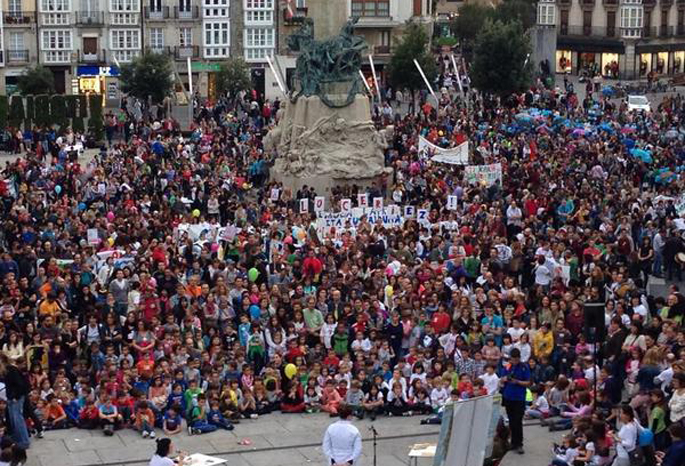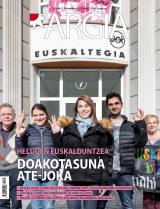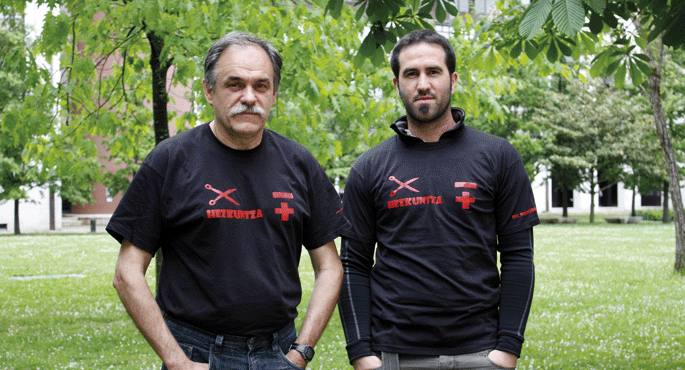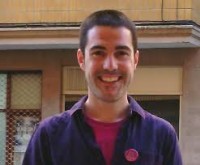United struggles for self-education
- “The Shirimiri of the LOMCE has smote all oppressed nations alike.” This is what the student movements of Hego Euskal Herria, Galicia and Catalan countries have told us. We have come to all three to tell us how they are confronted on a daily basis with an immobile but living Spanish educational law.

“In Basque institutions there is no one who can cope with LOMCE”
.jpg)
Samuel Pasandin, 18, is attending the Second Baccalaureate Division at Laudio, and is a member of the Ikasle Abertzaleak (Ikasle Abertzaleak) movement. In his words, the Government of Navarre and the Basque Government have been implementing the LOMCE for three years, but above all this year they will see it in the Baccalaureate, as external evaluations are planned by the end of the year. “They want to make a distinction between those who are valuable and those who are not, in order to exclude those who are not useful to the system,” says Pasandin. He says that the way to deal with the threat is disobedience: “As the first year of revalidation, we have the opportunity to work on disobedience and if we now close the doors, we may be able to open new ways to deal with what is coming in the coming years.”
However, the problem does not end with external examinations, as the law imposed from Madrid will have other consequences: The choice between Vocational Training and the University is premature, the disappearance of subjects such as Philosophy, the evaluation of the Religion Note, the passing of the Basque Country to the specialty... That is why he has emphasised the need for careful walking, as external studies are often conducted in isolation. He has considered that the path not to fall into this error is “to adopt comprehensively the educational problem to fundamentally transform the whole system”.
Samuel Pasandin does not see the future as clear: “The LOMCE is being applied and there is no subject in the institutions who pretends to paralyze that, the law has everything in its favor.” In view of this, the student movement is convinced that it will continue to struggle to achieve an educational system that meets the needs of students: “Liberator, local and with own contents”.
“Hinder the road to the normalization of Galego”
.jpg)
Iria Figueroa is 20 years old, studies Journalism and is a member of the union Estudantes de Galiza. It is clear that this law is an instrument to suppress Galicia as a nation: “It eliminates the contents of our nation, seeking uniformization so that it is not possible to transmit the reality and the history of this people.” He has been particularly concerned about the consequences of language: “It makes the road to the normalization of Galego difficult.” Until 2009, the current language standardization law dedicated more hours to Galician than to Spanish. However, when Alverto Núñez Feijóo took over the presidency of the Xunta, he reduced the hours of the Galician, for the benefit of English. And the LOMCE “is even more violent,” because it also breaches the minimum decree in force. To achieve the normalization of Galego, it has considered it essential to increase its presence in society and promote it through education. “But what is the only thing they do? Attack the Galician.”
It says that the Xunta de Galicia has no collaboration or communication with them. The student movement has asked the Department of Education for determination, but the answer has been an "absolute silence." Erguer Estudantes called the students on strike in February, and the Department of Education encouraged him not to push the strike. “Serious attitude”, according to Figueroa. "They said there was no reason for the strike because the negotiation was taking place in the Spanish state. The Xunta has turned its back on the educational community.”
The Galician students created the Erguer union a year ago with the aim of deconstructing the LOMCE through pedagogy. Iria Figueroa explained that the union's first steps have been hard, but that they have achieved the success of the initiatives carried out and that in the organised referendum, for example, the illegality was clear. Their demands are also clear: “A local law that addresses our real problems, carried out in collaboration with the educational community and committed to linguistic normalization.”
“This year’s big bet is to form a negotiating table with the government”

Andrea Terrón is 21 years old, teaches Political Science and Law at the Pompeu Fabran and is a member of the Union of Scholants dels Països Catalans SEPC. With regard to the damage caused by LOMCE in the Catalan countries, the focus has been on privatization: “Since the start of law enforcement, the number of concerted centres has increased considerably and these centres are often linked to institutions such as Opus Dei.” The pressure from these institutions has meant that democracy in the centres has faded. “In the past, there were joint school councils and now company councils.” This has meant “segregation, reduction of critical subjects and regression of language”. Catalan is now optional and Spanish, on the other hand, compulsory. Today there are only two centers in Spanish, but they can be extended with LOMCE.
Terrón says that the Generalitat has tried to broaden the application of the law, but that it has finally applied it. “They say it will have minimal effects, but they’re already noticeable.”
The SEPC has been pleased with the work being done through the student union: “Now we have more strength than ever.” In just one month, two students have followed two strikes and the follow-up has been total. The petitions consist in recovering the internal democracy of the schools, deciding on the curriculum in them, studying only in Catalan and removing subsidies to exclusionary schools. What will come is not clear. Pending the results of the force shown on the street, they intend to set up a negotiating table with the Government: “It’s the big bet of this course.” In case of achieving this, he explained that they will achieve it with the process of self-determination in Catalonia, because the demands go in the same line and behind the LOMCE there is "political interest": “Education in Catalonia is the weapon used by the Spanish Government to impose policies in line with its interests, and that must be avoided.”
Murgian ospatuko den Euskal Eskola Publikoaren jai atarian, hezkuntza arloko murrizketen aurka eta LOMCE lege-proposamenaren kontra borrokan diharduten bi elkartetako ordezkariekin bildu gara, Hezkuntzan Geu Eragileko Edu Zabala eta Denon Hezkuntzako Aitor Otañorekin... [+]
Erlojuaren orratzek egunari hasiera eman diote. Apunteak hartu eta korrika irten zara etxetik. Urduritasuna. Ordua da, heldu da azkenean. Tik-tak. Aurrera begira, lerro zuzenean eta bakarrik eserita. Isiltasuna. Hasi da azterketa, hasi da selektibitatea.
Ikasleok Zorrotz dinamikak deituta manifestazioa egin dute Arriagatik ehunka ikaslek 'Azterketa arrotz, ikasleok zorrotz' lelopean. Azterketa eta erreforma arrotzen aurrean eta Euskal Herri burujabearen bidean hezkuntza "herritik eta herriarentzat" eraikitzea... [+]
Espainiako Estatuko Konstituzio Auzitegiak atzera bota du PSOEk LOMCE legearen aurka aurkeztutako errekurtsoa, eta ikasleak sexuaren arabera bereizten dituzten eskolei diru-laguntza publikoak ematea zilegitzat jo du.
San Ignacion, Luis Elejalden, Aresketan… planto egin diote LH 6. mailako kanpo ebaluazioari. Hezkuntza Plataformen Topagunetik kalifikazio sistema “inposatu” honi planto egiteko deia luzatu zuten eta elkarlanean ari dira ikasleak, irakasleak eta... [+]
Luis Dorao, San Martin, Lukas Rei, Barandiaran, Umandi… Arabako 27 ikastetxe hauetatik 19 publikoetan egin nahi ditu frogak Eusko Jaurlaritzak martxoaren 5etik aurrera Lehen Hezkuntzako 6. mailako ikasgeletan. DBHn ere Pisa azterketa egitera deituko dituzte 4. mailako... [+]
We have recently seen the worrying results of Basque education. Recently, the PISA (International Student Assessment Programs) report gave us the first slap, as our students got very poor results. Because we were led to believe that from the Basque Government the teaching here... [+]
Ebaluaketak "merkatu eta politika neoliberalen menpe" daudela kritikatu du sindikatuak eta proba "jarraitu eta hezigarrien" aldeko dokumentua aurkeztu du.
Hezkuntza arloan bero bukatu zen ikasturtea EAEn eta indartsu ekingo diete berriz murrizketen aurkako mobilizazioei: abendura bitartean, greba orokorra eta arloz arlokoa, itxialdiak, elkarretaratzeak, solasaldirako tarteak, salaketa egunak, borroka asteak eta manifestazioak... [+]

























